Edited by Warwick Middleton and Kate McMaugh
Dr Colin Ross MD, served as President of ISSTD (which was then known as ISSMP&D), during one of the most turbulent periods of ISSTD history. Colin became President Elect in 1992, served as President in 1993 and Immediate Past President in 1994. The False Memory Syndrome Foundation was formed in 1992.
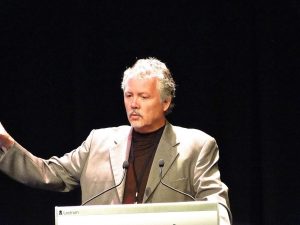
Dr Colin Ross, Sydney, 2011 (Photo by Warwick Middleton)
I was doing my psychiatry rotation as a third year medical student in 1979 when I was assigned to do an admission history on a woman I ended up diagnosing as having MPD. I talked to her alters and worked with her therapeutically, without any real supervision or guidance. Some years later she came to Winnipeg to be treated at the hospital where I was working as a psychiatrist. I published her case history in a 1994 special issue of the International Journal of Clinical and Experimental Hypnosis on MPD. I then diagnosed a second case as a psychiatry resident and a third case shortly after completing my residency in 1985. Then I started getting referrals, and doing research and I was off and running. I had no interest in trauma or dissociation before seeing that first case, although I had decided to be a psychiatrist as a child (a true memory corroborated by my mother).
KB: Is there anything that you experienced during your term as President that was most memorable, or stood out for you? CR: We were in the heat and thick of the false memory wars. … I really focused on keeping morale up and arguments as to why we could survive this … it was really a nice opportunity for me to try and be helpful to everybody else and support their morale. It was also a very stressful time.
Colin recalls that ISSTD, which was formed in 1984, grew very quickly, with approximately 800 people attending conferences in Chicago and Alexandria, Virginia. He recalls this as an exciting time in history, with a lot of interest in Dissociative Disorders. For Colin one of the challenging issues to face was the emotional issue of Satanic Ritual Abuse, which was increasingly being discussed at these conferences. Colin remains a strong advocate for therapeutic neutrality. 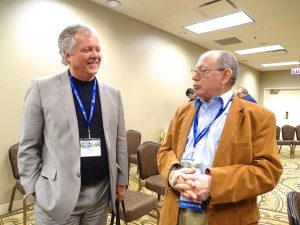
Drs Colin Ross and Rick Kluft, Chicago, 2018 (Photo by Warwick Middleton)
I was trying to advocate for a position of therapeutic neutrality and that was taken as a “non-believer” position. I think that the field at large, made a couple of errors there, which I am very concerned about … the error was basically that the “believer” people, the therapists who took the “believer” position, were diametrically opposed to the “non-believer” people, which was the “false memory” people. … If the ritual abuse actually happened or did not happen – that’s a whole diversion, a false premise which takes you away from your function as a therapist which is to maintain the position that you don’t know for a fact that it did happen, and you don’t know for a fact that it didn’t happen. You can’t prove it either way. We don’t have the resources to prove it. It all happened thirty years ago – and anyway it’s not your job, that’s a law enforcement issue. Your job is to help the person to get from Point A to Point B, which is helping a highly emotionally disturbed individual with mental health problems, to recovery. The first error that we made as a Society was … we bought into this agenda of having to take the “believer” position. When you take the “believer” position, it seems nice: it seems to be supporting the survivors, it seems like we are the good guys because we believe. But it leads to a number of problems … implicitly you are taking the position of, “I have the ability to determine whether your memories are real or not and I determined that they are”, which you haven’t actually done – yet I am giving you the feedback that I know, I believe. When you take the position that you are a person who can validate a person’s memories … you are implicitly taking the position that you also have the power to say, “No, the memories are not real”.
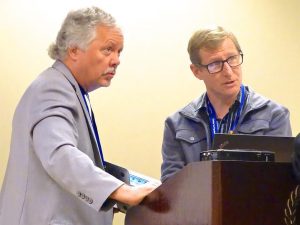
Dr Colin Ross and Prof Martin Dorahy, Chicago, 2018 (Photo by Warwick Middleton)
So this is just setting up in the transference as a replay of the relationship with the perpetrator, except now you’re the sheep. But in the nice validating sheep, there can be a wolf hiding. … So you’ve just recapitulated that in the transference, by being the nice guy public persona but implicitly you’re holding to yourself the right to come out and be the wolf and say, “It’s not true”. That is one problem. The next problem is it’s a complex DID system. In every single survivor with DID that I have ever seen, there’s always alters who are aligned with the perpetrator, the Dad, with the cult, with the programming, and if you take the position that it never happened, you are alienating them and usually alienating the host. If you take the position that it did happen, everybody’s satisfied because you believed that it happened … but the error made was aligning with the “good” alters, the host personality, against the “programmed satanic alters”. They’re bad; they’re programmed. You have to reform them, get rid of them: they’re not on your team – you and the host personality… So, when you’re trying to de-program the alters and you are aligned against them; we’re triangulated inside the system and you’re not therapeutically neutral then, you are missing the point that they’re holding the positive attachment. So it’s a problem of attachment to the perpetrator and you need to form an alliance with them just as much as you do with the good Christian host personality.
KB: Regarding the challenges facing the Society during your term, how did you weather the storms of the believers and non-believers and try to maintain a focus, not just for you personally, but as a Society at large? CR: That was a pretty turbulent era and the stakes were high. Units were closing, people were losing their licenses, there were massive lawsuits, and the way I weathered that personally is just the way I weather my entire professional career which is having a life outside my professional career, maintaining a variety of other interests, activities, hobbies, relationships etc. Without that, you’d be a sinking ship pretty quickly. I knew therapists who had pretty much full-blown PTSD – from listening to all these stories and being overwhelmed and frightened that the cult was after them and that the cult was monitoring them, I just made a decision not to be overwhelmed, not to be scared, not to be beaten down.
KB: Can you say anything about how you helped the Society keep its balance, given they were dealing with the pressures within, in terms of people who may have been abused, and as well as without – in terms of people who claimed it was all false? CB: Well, first of all, I don’t think I succeeded, because the membership dropped by over 50%. Most of the people who left were scared off by the threat of lawsuits, I tried to keep the field balanced through the President’s messages, through writing, through my general demeanour. The other angle I took on it, was I saw it as my ethical, professional and moral responsibility to police the field itself. So, I firmly believe then, as I do now, that there was actually quite a lot of malpractice going on and that in fact not all the memories were real and that there actually was an epidemic of false memories. There was also an epidemic of real memories…
WM: You have been criticized by some for writing on the deliberate creation of DID by the CIA. You have attracted some controversy by this and by other actions – e.g. writing a book titled “The Great Psychiatry Scam”, having Elizabeth Loftus write an Afterword for your book, “Satanic Ritual Abuse”, by writing on energy fields, by giving expert evidence for the plaintiff in “False Memory” trials, and by appearing in a Scientology video etc. Do you have thoughts on how effective such stances have been, and, from the perspective of today, would you have done anything differently? 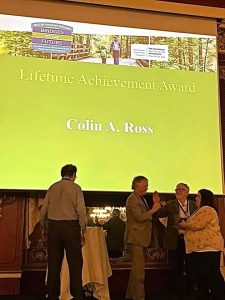
Dr Colin Ross receiving the ISSTD Lifetime Achievement Award, Chicago, 2018
Basically, I wouldn’t do anything different. I thought that trying to form a working relationship with people in the false memory camp was worth trying. It turned out that they all had completely fixed positions and weren’t willing to budge. But it was worth trying. I have no regrets about testifying for the plaintiff in a few false memory lawsuits – they involved clear malpractice. As far as energy fields are concerned, no regrets there either – I have a patent and a paper in a peer-reviewed electrical engineering journal resulting from this line of thought. This line of thinking and research is a combination of philosophy and science – my human energy fields book includes numerous testable scientific hypotheses and I have published original EEG data using high impedance, non-contact electrodes, as a result of this thinking. Concerning CIA mind control, no regrets there – my CIA Doctors book is based on documents that prove conclusively that artificial MPD was created by GH Estabrooks and these people were used operationally going back to WWII. This is clear and explicit in the documents and in Estabrooks’ writing. If people in the field insist that there are zero cases of artificially created MPD/DID that’s their right, but they’re wrong. And, concerning Scientology, I agree with a lot of their criticisms of psychiatry, but I think they are too black-and-white about it and too over-the-top in their tone.
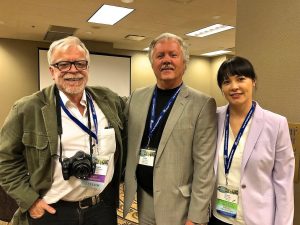
Interviewer Warwick Middleton with Colin and Dr Dana Ross, ISSTD Board member, and Colin’s daughter
My brain, my heart, and my solar plexus. I like writing in a variety of genres, so it’s not a chore for me. It comes naturally. Plus, the subject matter is so fascinating and challenging to figure out. I also like doing research. So, it’s a combination of creativity, focus, work ethic, intellectual challenge and the amazing fact that my profession is also my hobby, my recreation, and my work, all combined.
WM: You became involved in running inpatient programs for individuals with dissociative disorders in an era in which some other units struggled. What is the future, in your view, for inpatient programs which serve the needs of those with complex trauma/dissociative disorders? CR: Keeping hospital trauma programs open is a big challenge. It takes a lot of working with hospital systems and personnel, being mindful of regulatory and managed care pressures, doing trainings for referral sources, and having a good treatment model – in my case, with published Level II treatment outcome studies. For such programs to exist in the future, they will have to adapt to the realities of managed care and regulatory pressures, plus hostility from elsewhere in the profession. I’d say it’s iffy that such programs will remain in existence once the leaders currently identified with them retire. On the other hand, being trauma-informed is now a buzzword and that may lead to system pressures in favor of such programs surviving. The question is whether such programs in the future will deliver quality trauma therapy or just provide lip service to trauma.
KB: I am interested in whatever advice you want to offer the Society, either about what you are describing or anything else in terms of our going forward. CR: Well, going forward my number one advice is just, “Keep at it. Don’t give up. Don’t allow society to beat you down”. The core mission of working with trauma survivors and maintaining the reality of dissociative disorders, I’m 100% behind. But in order to reach those goals what do we need to do? As a Society we have absolutely got to recruit more energetic young people. The average age of the membership and the leadership, the people who are doing the public speaking, the writing, the research, which includes me, are getting older and older. We are not going to be around professionally thirty years from now. There’s not enough young, active, organisational, “get things done”, kind of people coming into the organisation. So we really need to focus on the recruiting of young professionals. If you look at treatment outcome research in the dissociative disorders field, it’s basically me and my collaborators and Bethany Brand and her collaborators. So, in no other field in psychiatry are all the treatment studies being done by two groups. … We cannot maintain and build our credibility without more research published in reasonably high-ranking journals.






